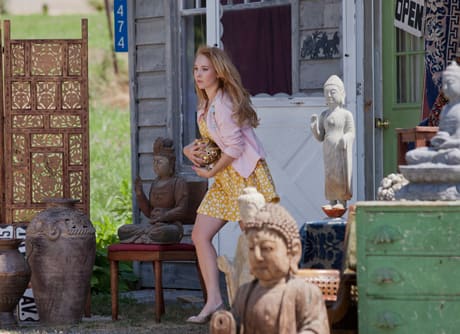First-time feature director Ramaa Mosley expands her prior short film into an affectionately silly and nastily funny modern fable concerning the pain people will inflect upon themselves and others in the name of an easy buck.
Juno Temple (Kaboom!) and Michael Angarano (Red State) deftly aid the subversion of the syrupy trappings of PG cautionary comedy with their deceptively measured and comfortably intimate performances as Alice and John, a loving young couple who genuinely enjoy life together, despite the strains of financial strife.
When John loses his soul-sucking cubicle job and Alice continues to strikeout while applying for jobs she's under-qualified for, the situation begins to look a little bleaker, but they persevere. Even when they show up woefully under-dressed to a class reunion, the realistically portrayed couple don't take it as a melodramatic affront to their poverty; they sarcastically mock the shallowness of their former classmates.
Time in that social meat-market forces some introspection though and Alice begins to show herself as the more self-conscious member of the married duo. It's no mistake that she's the one who finds, or rather steals, the titular teapot in the aftermath of what seems like a random minor car accident near an antique store – she's the one enticed by shortcuts and keeping up appearances.
Alice discovers that the teapot rewards physical pain with geo-specific currency on a sliding scale, and soon both her and John are treating the infliction of pain as a day job. With half-sincere promises to stop before it gets out of hand, the acts escalate from functional, but excessive – a full-Brazilian wax, dental work without anaesthetic, tattoos, light S&M – to serious self-trauma and much more complex forms of psychological torture as the teapot gradually reveals a ravenous and eclectic appetite.
A few unnecessary, but frequently funny subplots involving various parties trying to steal the mythical money-maker detract slightly from the pointed and cynical assertion that greed is the best aphrodisiac for honesty, which develops as the two love birds purposefully drag each other through the emotional mud of their darkest secrets.
Mosley manages to explore some pretty harsh realities regarding the principle-shattering lure of wealth while retaining a buoyant and charming tone – a little bit of sugar helps the ugly truth go down. Sure, the timing reflects the current economic downswing, but the unchecked pursuit of wealth is what civilization is built on, making this a timeless tale.
Unfortunately, The Brass Teapot pulls its finishing punch and, as a result, comes up just shy of greatness.
(Atlantic/Northern Lights)Juno Temple (Kaboom!) and Michael Angarano (Red State) deftly aid the subversion of the syrupy trappings of PG cautionary comedy with their deceptively measured and comfortably intimate performances as Alice and John, a loving young couple who genuinely enjoy life together, despite the strains of financial strife.
When John loses his soul-sucking cubicle job and Alice continues to strikeout while applying for jobs she's under-qualified for, the situation begins to look a little bleaker, but they persevere. Even when they show up woefully under-dressed to a class reunion, the realistically portrayed couple don't take it as a melodramatic affront to their poverty; they sarcastically mock the shallowness of their former classmates.
Time in that social meat-market forces some introspection though and Alice begins to show herself as the more self-conscious member of the married duo. It's no mistake that she's the one who finds, or rather steals, the titular teapot in the aftermath of what seems like a random minor car accident near an antique store – she's the one enticed by shortcuts and keeping up appearances.
Alice discovers that the teapot rewards physical pain with geo-specific currency on a sliding scale, and soon both her and John are treating the infliction of pain as a day job. With half-sincere promises to stop before it gets out of hand, the acts escalate from functional, but excessive – a full-Brazilian wax, dental work without anaesthetic, tattoos, light S&M – to serious self-trauma and much more complex forms of psychological torture as the teapot gradually reveals a ravenous and eclectic appetite.
A few unnecessary, but frequently funny subplots involving various parties trying to steal the mythical money-maker detract slightly from the pointed and cynical assertion that greed is the best aphrodisiac for honesty, which develops as the two love birds purposefully drag each other through the emotional mud of their darkest secrets.
Mosley manages to explore some pretty harsh realities regarding the principle-shattering lure of wealth while retaining a buoyant and charming tone – a little bit of sugar helps the ugly truth go down. Sure, the timing reflects the current economic downswing, but the unchecked pursuit of wealth is what civilization is built on, making this a timeless tale.
Unfortunately, The Brass Teapot pulls its finishing punch and, as a result, comes up just shy of greatness.
